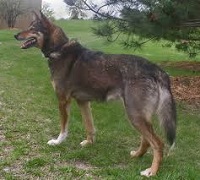Originating from the Native Village dog, the Alaskan Husky comes from the northern areas of Canada and Alaska. Its image is widely known from movies shot in the cold environment of the North Pole, where sleigh dogs impress with their ability to run over long distances in unfriendly weather conditions.

As a matter of fact, this breed is famous for its speed, which made it win many dog sled racing competitions over the years. The dogs that are highly performing in such contests can be worth a lot of money (up to $15,000).
The Alaskan Husky is average-sized, with males weighing up to 60 pounds (25 kg) and females up to 48 pounds (19 kg). Just like other dogs, their life expectancy is 15 years at most. What distinguishes them is that they greatly vary in color, their fur ranging from white to brown.
Although they are not known to be aggressive, the fact that they have wolf ancestors makes them openly engage in fights, usually in their natural habitat, with angry moose. However, it is surprising that, despite their violent encounters every now and then, moose have learned that the Alaskan Husky can be a good alarm signal when wolves are approaching their sleeping shed. Therefore, it is not uncommon for moose to choose to sleep in the vicinity of yards where Alaskan Huskies are located.
Due to their history, the Alaskan Huskies like to spend time in a pack and may become quite destructive if kept in an apartment and if not properly exercised or walked. At the same time, masters may find it difficult to walk them, because they are great runners and tend to give in to their natural instincts when taken off leash. However, if you are looking for the perfect silent companion for a jogging session, this dog is the solution. You need to constantly consider weather, since the Alaskan Husky can have a hard time running in hot weather.
To counterbalance this shortcoming, you will find this dog quite affectionate, playful, and loyal. It enjoys car rides due to his adventurous spirit, and will quickly make new friends along the way.
Keeping such a dog in a fenced yard may also prove a challenge, since it tends to either jump over the fence or dig underneath it in order to explore the outside world.
If you plan to have this dog for retrieving purposes or guarding your property, think again. Its genes do not place it among the most natural and skilled retrievers, nor push it to bark when somebody is trying to trespass on your property. It would rather make friends with a trespasser than bark him away.
Irrespective of the reason why you decide to get such a dog, it will surely make you fall in love with it instantly. Plus, having an Alaskan Husky with you on a jogging session will definitely make heads turn.




